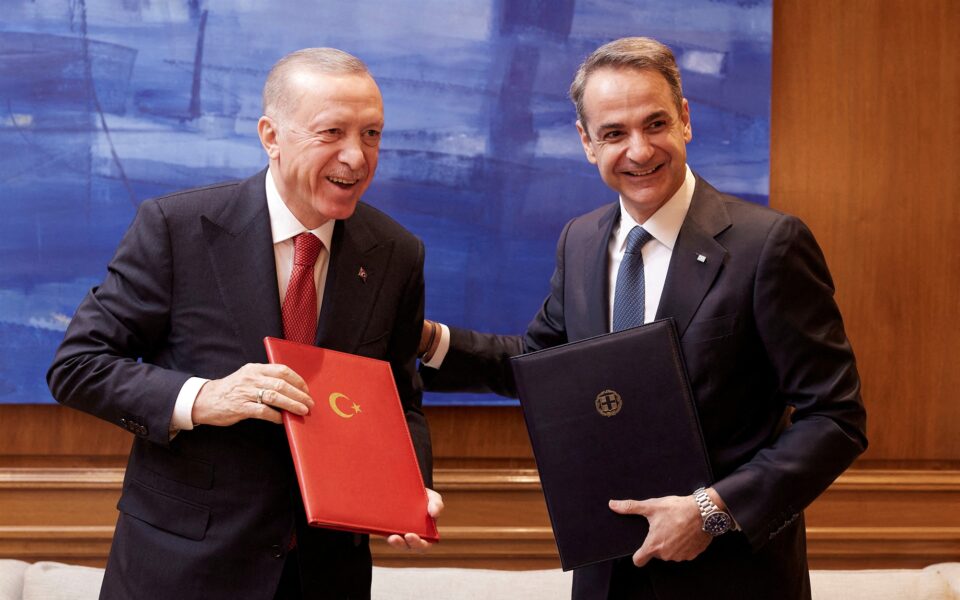The consequences of the Athens Declaration

The Athens Declaration signed by the president of Turkey and the Greek prime minister is a political text that does not legally bind the two parties. This is explicitly stated in its text itself, which emphasizes in its penultimate order: “This Declaration does not constitute an international agreement binding upon the Parties under international law. No provision of this Declaration shall be interpreted as creating legal rights or obligations for the Parties.” Consequently, and since international law is consensual (that is, it is based on the consent of the parties), we must accept that the two parties did not wish to be bound on the basis of international law by an agreement that would produce legal effects.
What does this nonbinding nature of the declaration mean? That, basically, none of the parties (Greece or Turkey) can invoke its provisions to demand compliance from the other party nor be used by a party to appeal to an international judicial body, as a basis of jurisdiction, in case of violation of one or more of its provisions.
This, however, does not mean that it is a redundant text of no legal significance. The text of the declaration contains major provisions concerning the building of friendly ties between the two countries, among which we distinguish the reminder of the fundamental purposes of the Charter of the United Nations, which is the maintenance of international peace and friendly cooperation between states. At the same time, they agree on the cultivation of friendly relations, mutual respect, peaceful coexistence, understanding, and the resolution of their differences by peaceful means and in accordance with international law.
This last one, namely international law, shows how far we are from the beginning of the disputes (in 1974), when Turkey considered that all our disputes were political and that the only necessary solution was a political solution. That is, the one that would be imposed by force and not by law.
On the basis of the extensive preamble, the two parties agreed to start a political dialogue, thus formalizing the dialogue that has already started between the two deputy ministers of foreign affairs, to address issues of mutual interest and the exploratory consultative talks. In essence, the political dialogue is the heir to the exploratory contacts of the past, taking on the heavy task of smoothing out differences on preliminary issues, before the start of formal negotiations on the continental shelf and the exclusive economic zone (EEZ). This is where Turkey’s good intention and faith in finding a solution for the borders of the territorial sea will be judged, but also Greece’s readiness for the way it will respond to the twin issues of open sea and safe passage through the narrow sections in the Aegean.
At the same time, however, the role of political dialogue is being upgraded, because it is not limited to exploratory talks, but also extends to matters of mutual interest. Does this mean that political dialogue plays the role of de-escalating crises that could derail peace and good neighborliness, assuming the role of crisis management? The question will be answered in the field, if such a need arises.
The Athens Declaration may not be a binding text, but it creates commitments for the two states that cannot be ignored
A second way of neutralizing the risks of sudden conflict is the envisaged confidence building measures, which include measures in the military sector, which would contribute to the elimination of unjustified sources of tension. There was also a similar initiative in the past – unfortunately with limited positive results.
Finally, a positive agenda is foreseen, which includes issues of low politics which strengthen the rapprochement of the two countries and which concern the sectors of the economy, tourism, transport, energy, agriculture, environmental protection, education etc. In the context of this positive agenda, international agreements were signed between the ministers of the two countries, including an agreement on the granting of seven-day visas by Greece to Turkish citizens to visit Greek islands in the eastern Aegean, after consultation with the European Union.
The Athens Declaration may not be a binding text, but it creates commitments for the two states that cannot be ignored. Of course, it cannot cancel the Turkish casus belli nor force Greece to agree to territorial waters of less than 12 nautical miles.
And it is a shame that such an important text did not take the form of an international agreement. But let’s not complain: The point we have reached with Turkey is already a major success, if we consider what was happening a few months ago and how in 2020 we almost had an armed conflict, which could have ended in an unfavorable development for both countries.
Christos Rozakis is emeritus professor at the University of Athens.





